Attached dossier
The developer Sergei Polonsky is a vivid example of a person whose personal qualities made him incapable of controlling the money that fell into his hands in a civilized way. Thanks to luck and support from officials he has managed to launch a series of major construction projects. But when difficulties occurred, the projects began to resemble a pyramid scheme. At the same time Polonsky spoilt his relations with most of his patrons and began using criminal methods in confrontation with opponents. The behavior of the developer in public made him look like a clown.
Not good enough for space travels
Until 2009 Sergei Polonsky was not involved in any major financial scandals. Apparently, that was partly because at that quiet period he emerged in all his glory. Being selfish, unbalanced, and infantile, he tried to hide such childish qualities behind ostentatious extravagance.
Everyone remembers the story of Polonsky’s failed attempts to conquer space.
In August 2002 he paid $ 30 thousand for medical examination at the Institute of Biomedical Problems, and was found fit for pre-flight training. In January 2003 Polonsky completed a pre-flight training course at the Cosmonaut Training Centre named after Gagarin in Zvezdny Gorodok, having paid about $ 170 thousand. But when it came to the conclusion of the contract for the flight, he agreed to pay only $ 8 million, while the auction earlier began with $ 20 million and never fell below $ 12 million. Thus, the businessman’s first attempt to go to space failed.

Polonsky at the Cosmonaut Training Centre
In June 2004 Polonsky was going to make a second attempt to travel into space. He once again passed a medical examination for $ 30 thousand, and having received admission, he began preparing for the launch. They say, it cost Polonsky nearly $ 800 million. He also completed financial formalities and paid for the flight, especially since he had a considerable discount. The cost of a ten-day trip could reach only $ 13 million, mainly because there were no other businessmen who wished to go to space. However, Yuri Semenov, president of the rocket-space corporation Energy, spoke against sending Polonsky into space. The corporation, along with the Federal Space Agency (FSA), signed contracts for commercial flights. Thus the flight did not take place again.
Polonsky’s third attempt to fly into space also failed. The official version stated that it was because of excessive weight and height of the unlucky businessmen.
In any case, the whole country watched the infantile businessman willing to spend $ 13 million on an extravagant entertainment, although at that time he had not had a single more or less serious commercial project completed. It is not difficult to guess that the man chose entertainment over investing in the business so as to at least to increase its reliability.
A miser billionaire
Against the background of such effuse expense, the 2007 story of his divorce with Natalia Stepanova, the owner of Stroykonsaltgrup and a beauty, is quite noteworthy. When the couple was facing divorce, Polonsky sold Mirax to an offshore company, which in his view, apparently, would help him protect himself from too much of a financial loss in the divorce proceedings. Moreover, the situation became absurd as Natalia Stepanova received only 150 rubles a month from her former husband in child support.
It is worth mentioning that at that time Sergei Polonsky was a dollar billionaire.
It is interesting that Sergei Yurievich Polonsky did not hide details of their family conflict from the press. In particular, he replied impressively to the questions of journalists about the reasons for such stinginess in respect to the mother of his child, saying with pretentiousness “My son will live as a crown prince!”
By the way, Polonsky’s narcissism was so over the limit that he gave both his son and his dog the name Mirax.
The situation around Polonsky and famous ballerina Anastasia Volochkova ending their relationship looked even worse. They say, the jealous Volochkova left Polonsky because of his increasingly close friendship with Andris Liepa.

Polonsky and Anastasia Volochkova
Polonsky always made sure the mass media had something to discuss about him. Already at that time Sergei Polonsky managed to make statements, the essence of which seemed to have been not exactly clear even to the very Polonsky. For example, once he said that he had spent a day in a coffin at a real cemetery. Ostensibly, the coffin was, as expected, boarded up with nails, and next to it there were other coffins with dead men in them.
But even amid such extravagant behavior (to put it mildly, if Sergei Yurievich did spend a night in a coffin, then it is more than extravagance and requires an appointment with a physiatrist and follow-up), the entire business world was shocked by his statement at the cocktail party in honour of the real estate exhibition MIPIM -2008 in Cannes. There he said that “Those, who do not have a billion, are losers and I tell them go to hell!”
At that time, according to Finance magazine, Polonsky was in the 40th place among Russian billionaires with a fortune of 106 billion rubles. His commercial career started 8 years ago. Only a year was ahead of him before complete financial collapse.
In this connection it is interesting to see Sergei Polonsky’s attitude to money, the money he could have long used for completing his numerous pretentious projects.
Son of a Turkish citizen
Experts have repeatedly drawn attention to the strange contracts that Sergei Polonsky signed abroad.
Take, for example, the acquisition of Sungate Port Royal hotel by Polonsky in the Turkish resort of Kemer for 370 million euros. The price of this property was highly overstated. In addition, the Russian businessman chose to pay the former owner, Mehmet Nuri Gelikbagu, most of the amount in cash. Sergei Polonsky took out a loan from a Turkish bank Vakif only worth 150 million euros, with the hotel as collateral.
Subsequent events have shown that the odd terms of the purchase were unlikely to have resulted from coincidence. Polonsky chose not to manage the hotel and not to pay out the loan. In early 2009 he made a technical default on a payment to Vakif. A year later he stated that he was able to sell the useless property for 12.5 million euros. The generous buyer turned out to be Mehmet Nuri Gelikbag, the previous owner of the hotel. One can easily guess where the hundreds of millions paid for the hotel in 2007 went.
Similar troubles, so to say, pursued Sergei Polonsky’s project in the UK
In summer 2008 he solemnly announced a new large-scale project in London. Just like in the Russian capital, Polonsky was going to build a skyscraper on the banks of the Thames, and thus his company acquired a 50 percent stake in Beetham Tower project from the English developer Beetham Organization. The transaction cost Polonsky 60 million pounds, or about 118 million dollars. According to the draft of the project, the 52-storey building with total area of 100 thousand square metres was to stand near the Tower of London, allowing the court of her Majesty to observe the life "of a multifunctional complex with a hotel, retail and entertainment units, and apartments."
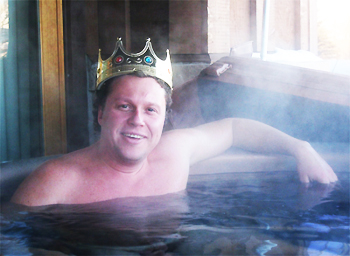
Millions of dollars were lost in foreign projects, but Polonsky could care less
Cost of the project was about 0.5 billion pounds. To recapture these costs, developers would have had to sell the apartments at the price of 30 thousand pounds per square foot, which even for London was extremely high. Polonsky, it seemed, was ready to consider profits when, quite predictably, a scandal burst out. Local developers in Beetham Organization Limited decided that the midst of the crisis was not the time to build the skyscraper. Polonsky’s share, like in the case of the Turkish hotel, went to the banks since it served as collateral on the defaulted loan, which the Russian businessman took out for this paper project. Creditors also received the £ 10 million, which the owner of Mirax Group took out as a loan to finance the reconstruction of old Cornwall Terrace villas in the heart of London. As expected, the local community was against the venture.
Another 50 million euros disappeared in a similar manner. Sergei Polonsky was supposedly going to invest the sum in the construction of the ski resort Aminona-Est in Switzerland. The same happened with 200 million euros, allegedly intended for the construction of Astra Montenegro, a city of clubs, in Montenegro.
No one except Polonsky can say how much of Mirax funds disappeared in Polonsky’s incredible foreign projects. However, there are some interesting figures related to that. According to official statements, Mirax Group net profit in 2006-2008 amounted to approximately $ 1.3 billion, and in spring 2009 the company's debt totaled to $ 400 million. Where did all the money go so quickly?
Fools are lucky, they say
Before the 2008-2009 crisis Sergei Polonsky managed to avoid being involved in major financial scandals, for three reasons. First, he always had support of high-ranking and influential officials such as Moscow Mayor Yuri Luzhkov, or Nikolai Koshman, head of Construction Committee of Russia, or Arkady Dvorkovich, presidential aide on Economic Affairs. Second, whatever happened with the business of Polonsky, his problems always stayed away from the public eye. Polonsky was always generous when it came to advertising and PR- contracts with major federal mass media and Internet portals covering real estate market. Any information agency that asked for comments on some facts and events inconvenient for Polonsky was immediately taken care of by Mirax press service or Polonsky in person. As a rule, such agencies were bribed to keep silence and those who would not cooperate were intimidated or sued. The businessman’s companies had no problems with buying court rulings. And third, Polonsky was lucky, in accordance with an old Russian proverb that says that fools are lucky.
In summer 2007 Polonsky told reporters about his good relations with the then Mayor of Moscow, Yuri Luzhkov, and Luzhkov’s wealthy wife Elena Baturina. In 2009-2010 Mirax Group had in its top management positions such influential people as Nikolai Koshman, former head of Construction Committee of Russia, Michael Dvorkovich, brother of presidential aide Arkady Dvorkovich, and Oleg Kosovan, son of the head of the Department of Urban Development in the Moscow City Hall. By that time little good was said about Mirax Group.
The following event perfectly reflects the nature of relationship between Polonsky and presidential aide Arkady Dvorkovich. In mid-September 2011 Polonsky was trying to win back the construction site of Kutuzovskaya Milya complex and Michael Dvorkovich ensured administrative support for him. Apparently, Dvorkovich did so with the help of his high-ranking brother. A video was uploaded to the Internet in which Polonsky grabs the cell phone the Michael Dvorkovich was talking on and in a totally disrespectful manner, as if to a subordinate, yells into the phone "Arqash [short for Arkady], can you come here, f ** *ing shit!? "
"Are you crazy?"
And finally, everybody knows about the close relationship between Sergei Polonsky and Vladimir Resin, first deputy mayor of Moscow in charge of construction. For many years Resin supported business projects of Polonsky. But in the end, Polonsky had an argument with this influential official. And when he did, he came up with nothing better than writing a letter to Moscow Mayor Sergei Sobyanin complaining about Resin, and at the same time publishing the letter on the Internet. In spring 2011 Polonsky wrote the letter to Resin personally and also published it. His appeal to the head of urban construction policies of Moscow Polonsky began with the words “Dear Mr. Resin, are you crazy?”

Vladimir Resin no longer supports the man who called him "Dad"
Sergei Yurievich wrote that earlier he called Vladimir Resin "Dad", but even that did not work. Once he referred to Elena Baturina as "mother". As a result of Polonsky’s stupid argument with Resin, Moscow construction committee temporarily withdrew its permission for the construction of Federation business complex in Moscow-City. The reason for withdrawal was that the committee members qualified the state of the construction site as unsatisfactory, as Vostok tower of Federation complex proved to have violations in the quality of construction, fire safety, and electrical safety.
In general, in the best traditions of Polonsky, he made another stupid thing thus causing damage to investors in the project.
In response to the hysterical letters by Polonsky, Resin said quite openly “How long could I support and cover him?” Through the head of press service Igor Kanevsky, Vladimir Resin said that Sergei Polonsky should have thought about shareholders and completed the project rather than engaging in publicity stunts.
One gets the impression that the hysterical boy annoyed the official so badly that Resin simply considered it inappropriate to continue to support the construction frenzy, which in recent years consistently accompanies all projects of Sergei Polonsky. Another argument for no longer providing support for Polonsky was that Yuri Luzhkov was replaced by Sergei Sobyanin, who did not sympathize to favorites of his predecessor and certainly was not interested in scandals around defrauded real estate investors.
It looks like the support of influential officials and luck had helped Sergei Polonsky to avoid problems in the middle of the last decade that could stem from little-known ugly situations in his business. Thereby he entered 2009 relatively well-reputed.
This was the case with the scandal in participatory construction market of Moscow and St. Petersburg, which burst around the construction sites of RosGlavMaterialy JSC. In St. Petersburg, for example, the situation escalated to the point where defrauded real estate investors were forced to picket the Smolny. Later, RosGlavMaterialy was renamed to Stroymontazh, and the conflict subdued. At least for Polonsky, who partially owned RosGlavMaterialy and then Stroymontazh.
The same happened during the conflict between Mirax Group and the development company Sistema-Hals over the project of luxury apartment bloc construction in Kostyanoy Pereulok in Moscow. Mirax Group owed Systema-Hals more than $ 20 million, and only a lucky coincidence helped to resolve the situation. It turned out that Sistema-Hals owed to a company that owed to Mirax, which allowed netting.
Not surprisingly, with such an attitude to his business Sergei Polonsky was absolutely not ready to confront troubles that plagued all of the domestic construction industry during the crisis of 2009.
Mirax Pyramids
By the time of crisis, Sergei Polonsky controlled a dozen major construction projects. Those were all very expensive projects and the ambitious businessman repeatedly claimed that he built only the most elite real estate and that he was not interested in building apartment blocs for common people.
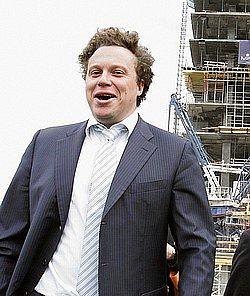
Failed projects seem to make Polonsky more arrogant
Among Mirax flashy projects there is Federation Tower, Kutuzovskaya Milya, Dubrovskaya Sloboda and others, totaling to about a dozen or so loudly advertised projects. And all of them from a financial point of view turned out to be similar to a pyramid, with naturally led them to a complete collapse as soon as the construction business lost stability and real estate prices stopped to go up. People who have invested in these projects, just as naturally found themselves, in the words of Polonsky, in hell, where he openly and cynically sent them in 2008 in Cannes.
Now the group is called Nazvanie.net which in Russian means “no name”. By doing so the businessman decided to creatively resist interest holders deluded by Polonsky, who were quick to come up with the site Miraxa.net which in Russian means “Mirax is gone”. So Polonsky decided that his company now Nazvaniya.net, that is has “no name”.
Polonsky sold cheaper than prostitutes
Here are the most vivid examples.
In 2002 Moscow authorities and FCSR JSC signed an investment contract for the project Kutuzovskaya Milya, an elite residential complex in the 1st and 2nd blocs of Fili-Davydkovo district. Companies in some way related to Mirax Group were co-investors in the construction. In the best traditions of Polonsky, in 2009 Mirax stopped the project. As a result, Polonsky was expelled from the project. Mirax-Fili, a subsidiary of Mirax Group, that was the technical customer of the project, sent a claim to the Arbitration court demanding FCSR to pay 1.9 billion rubles. But the court did not satisfy the claim since as usual, Polonsky’s claims to the developer were not convincing for the court.
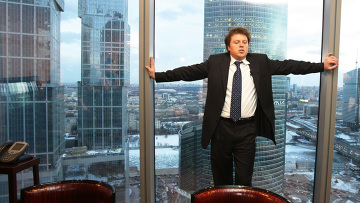
Polonsky gives 100 dollars tours around his Federation project
Not wanting to put up with the loss of a profitable project, Polonsky began to demand the FCSR management who owns the land of Kutuzovskaya Milya to assign the rights to build the residential complex to some MSM-5. In the meantime construction was frozen and interest holders still send claim after claim to many government agencies.
Federation complex in Moscow City is one of the most ambitious projects of Polonsky. According to the businessman, the complex would be 506 meters and would become the tallest skyscraper in Europe. But that is only words. When the crisis began and all construction sites of Polonsky were frozen, he could think of nothing better than to publish ads saying that he was willing to sell everything he had because he urgently needed money. The ad contained a proposal in which Polonsky expressed willingness to give an hour-long tour for $ 100, which he promised to personally conduct for any potential buyer of Federation. Despite the fact that the price was equal to that of a not very expensive prostitute, there was no information as to whether anyone took advantage of the offer.
Federation cut by a third
In December 2009 Polonsky announced his plans to make Federation skyscraper lower by a third in comparison to initial project draft. The businessman was ready to make Vostok tower, that was under construction and initially was planned to have 94 floors, as high as the 64th floor which was the last finished floor. His unexpected announcement Polonsky explained by the fact that banks for some reason did not want to give him credits on favourable terms to complete the tower. A total of $ 100 million would be enough, as stated by Polonsky, to complete Federation if cut by third. Previously the completion of the project required some $ 240 million.
In the end, Sberbank and Alfa-Bank that controls debts of Polonsky worth hundreds of millions of dollars, taking as collateral all of the objects of the businessman allegedly found the funds necessary for the completion of Federation, but the tallest building in Europe if still unfinished.
Similar unpromising situation for real estate investors happen at other construction sites of Polonsky. For example, the interest holders of the residential complex Wellhouse on Dubrovka addressed to the mayor of Moscow, Sergei Sobyanin, asking to "isolate" Sergei Polonsky from construction of the complex, because of his management of the project led to the complete freezing of the construction.
It is worth adding that Mirax Group construction sites at least twice were mentioned in criminal cases. One case was instituted over a large plot of land fraud in the Kremlin embankment, where Polonsky is building a multi-purpose complex worth nearly $ 200 million. The second criminal case was instituted over electricity theft in Zolotye Klyuchi complex. Both cases are currently in the preliminary investigation stage.
Meanwhile, as of summer 2011, total outstanding debt of Mirax Group exceeded one billion dollars.
Theatre-in-law
Head over ears in debt, Polonsky could not come up with anything better than to give regular theatrical performances in front of reporters.
In March 2011 he held a press conference during which he announced the closing of Mirax brand. He described the decision as balanced and coherent, once again promising to pay off all creditors and to finish all Mirax projects. Sergei Yurievich did not specify how he was going to do that with all the staggering debts that he had and his apparent helplessness in business. Instead, he finished his statement to reporters in a manner very characteristic of him, saying that “From this moment I can no longer be a businessman”. Then he melodramatically burst into tears and quickly left the room.

One-conman show
A few days later it turned out that he continues to consider himself a businessman. But the brand name Mirax actually stopped its existence and was replaced by something hysterical, Nazvanie.net. After that his behavior during the press conference has become quite comprehensibly an outline of re-branding advertisement. Some symptomatic changes were also introduced to the business of Sergei Yurevich.
In particular, Nazvanie.net had new co-owners, namely Roman Trotsenko, head of the United Shipbuilding Corporation, and Vladimir Golubev, co-owner of Adamant holding. The latter two own 50% in Nazvanie.net, and the other 50% remained in the ownership of Sergei Polonsky.
Business partnership with Vladimir Golubev is interesting in itself. Law enforcement authorities of St. Petersburg know as a criminal boss, nicknamed Barmaley. Meanwhile, a few years ago St. Petersburg business community discussed Golubev meeting Tambov criminal group leader, Vladimir Barsukov. Supposedly, Golubev claimed his financial independence at this meeting, after which got stabbed with a fork in the buttocks and was forced to have so to say a little cruise on the rivers of St. Petersburg without a craft, simply tied to the boat. But this is, of course, the rumours, which, however, provide for a variety of assumptions about the future of construction projects of Polonsky.
In general, it appears that the collapse of business has provoked Sergei Polonsky to obtain certain criminal characteristics.
Polonsky thinks he is a gangster?
Thus, on May 24, 2011 there was a murder attempt in regard of Petr Ivanov, FCSR CEO. The attempt resembled a Hollywood film. The gunmen drove to the office of the businessman in a white convertible and almost point-blank shot from a traumatic gun. Petr Ivanov was saved by a bodyguard. The police and the Investigative Committee in Moscow have not yet found the killers. The crime occurred in the midst of the conflict between FCSR and Mirax. Arbitration court still holds hearings of lawsuits resultant from the conflict and the situation seems to develop not in favour of Polonsky. The essence of the conflict is the same. The lawsuit is over lost money of interest holders, which Polonsky was to invest in the construction of one of his ambitious project, Kutuzovskaya Milya.
Interestingly, around the same time Dmitry Uchitel, coordinator of Kutuzovskaya Milya shareholders union, told journalists of threats of physical violence. In recent years the man actively and convincingly criticizes commercial bluff of Sergei Polonsky.
In May 2011 several men were waiting for another opponent of Polonsky, businessman Maksim Privezentsev. They threatened him and his friends promising trouble, and then burned the businessman’s car. Polonsky has had a conflict with Privezentsev since autumn 2009, when Sergei Yuirievich groundlessly accused the businessman of stealing 650 million dollars from Mirax Group. The money was intended for reconstruction of Kurskaya metro station in Moscow. In court, Polonsky, as usual, failed to provide evidence, but did not drop the claims against his former partner.
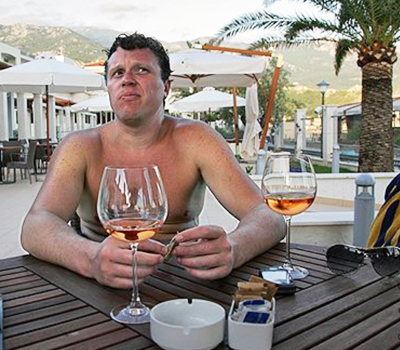
Polonsky as gangster
In connection with these ugly events, the business community burst in rumours that everything that happened was a result of cooperation between Sergei Polonsky and another criminal boss, Sergei Efimtsev, who was formerly known as Vakhtang Laliashvili, an active member of Uralmash organized crime group in Yekaterinburg. Those who discussed the rumours pointed to the coincidence that Sergei Efimtsev had been released from prison shortly before the criminal events that victimized opponents of Polonsky. Moreover, Efimtsev, according to rumours, owed big money to Polonsky.
Simulation of insanity is normal in case of bankruptcy
The bankrupt businessman did not change for the better. Take his obvious social maladjustment. For example, in August 2011 he managed to have a public conflict over nothing with Vladimir Yakunin, the president of RAO Russian railways. In one of his many letters Polonsky said that activities of Russian railways president "lead to the impoverishment of the people." From this Polonsky concluded that Yakunin should not participate in the delivery of Easter Holy Fire from Jerusalem to Russia. It is not difficult to imagine what Yakunin felt when he, who heads the public fund for Holy Fire delivery, heard those words.
Vladimir Yakunin went to court, and Sergei Polonsky, without hesitation, filed a counterclaim against Yakunin, allegedly being offended by the phrase that contains a statement of the obvious. Yakunin wrote in his blog that "the bankrupt businessman, being out of work, began looking for someone to blame for the fact that he got robbed by his former business partner”.
These events happened in August 2011. Presumably, Sergei Polonsky has since been concerned about the lack of monthly federal news coverage that would mention his name. So in mid-September during filming an NTV network television programme, he decided to shock the public by his astonishing sharpness in words, but, as usual, he forgot about the invisible line that separates being eccentric from being rude, for which he paid when banker Aleksander Lebedev hit him in the face.
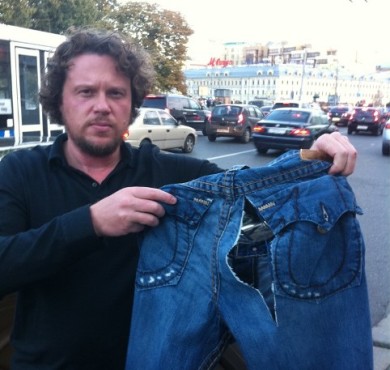
He finally decided to think about his future
“He was so scared, thinking that Lebedev would beat him up, but when he realized that everything was over, he started moaning and telling everyone about his shock. Such a wretched, worthless person he is”, said Senator Sergei Lisovsky, who was also present there, describing the incident. Today, the fate of thousands shareholders is held hostage by this "wretched, worthless person". And, apparently, only because of this Polonsky has not yet been sent to prison for building pyramids and fraud of selling nothing instead of finished apartments.





